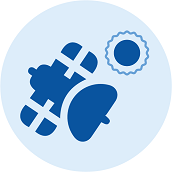Trust your Danger Sense
There won’t always be time for an official warning. It is important to recognise the natural warning signs and act quickly. Trust your danger sense, don’t wait for an official alert.
On this page
Some emergencies reach you faster than an official warning can.
That's why it's important to learn the natural warning signs of an emergency and trust your danger sense when you see them.

Stay informed in an emergency
There are lots of ways you can stay informed in an emergency. Radio, Emergency Mobile Alert, Civil Defence Emergency Management Group websites and social media channels let you know what’s happening and what you should do.
But the most important way to stay informed is to understand your hazard risk and know the natural warning signs.
Understand your hazard risk
Learning about the hazards that can happen near you will help you work out what steps you can take to get prepared.
Find out from your local Civil Defence Emergency Management Group which hazards can affect you. Ask:
- Are my most-visited places in a hazard zone?
- What hazards could impact my community?

Find your local Civil Defence Emergency Management (CDEM) Group.
Make a plan
An emergency plan helps you know what to do in an emergency and how to get ready. Having a plan helps make actual emergency situations less stressful. Every household's plan will be different, because of where we live, who lives with us and who might need our help.
[Rain and thunder sound outside while water pours into a house through the entryway and living room. The words 'Trust your danger sense in an emergency' stand large on the couch]
[Silence as the Civil Defence logo appears with the words 'When waters start to rise, don't wait for an official warning. Trust your danger sense and move to higher ground.']
[Back in the living room now filled with flood water. The same words float and a beeping car has been thrown into the house.]
Trust your danger sense in a flood
Floods happen often in New Zealand and can cause a lot of damage and loss of life. Floods and flash floods can happen quickly. If you see rising water do not wait for official warnings. Head for higher ground and stay away from floodwater.
-
- Severe weather warnings in your area on the MetService website(external link).
- Rising water anywhere near you.
-
- Act quickly and head for higher ground. Do not wait for official warnings.
- Do not try to walk, swim, or drive in floodwater. Even water just 15 centimetres deep can sweep you off your feet. Half a metre of water will carry away most vehicles.
- Assume that flood water is contaminated with farm run-off, chemicals and sewage.
-
- Find out from your local council if your home or business is at risk from flooding and how they’ll alert you if you need to evacuate. Ask about:
- Evacuation plans and local public alerting systems
- What to do with your pets and livestock if you have to evacuate
- How you can reduce the risk of future flooding to your home or business.
- Work out what supplies you might need and make a plan together.
- Practise your emergency plan and your evacuation route to higher ground.
- Take measures to reduce potential flood damage and make sure your insurance policy covers you for flood damage.
- Find out from your local council if your home or business is at risk from flooding and how they’ll alert you if you need to evacuate. Ask about:
Trust your danger sense in a tsunami
All of New Zealand’s coastline and large lakes are at risk of tsunami. Knowing the warning signs and the right action to take can help save lives.
-
- A strong earthquake that makes it hard to stand or a long earthquake that lasts more than a minute.
- A sudden rise or fall in sea level.
- Loud or unusual noises from the sea.
-
- Wait until the shaking stops.
- Move to the nearest high ground, or as far inland as possible.
- Walk, run or cycle if at all possible to reduce the chances of getting stuck in traffic congestion.
- Take your animals with you only if it will not delay you. Do not spend time looking for them and if you are not at home, do not return to get them.
- While evacuating, avoid hazards caused by earthquake damage, especially fallen power lines.
- Do not return until you get an official all-clear message from Civil Defence.
-
- Check our nationwide tsunami evacuation map and see whether your home, school or work is in a tsunami zone.
- Plan and practice your tsunami hīkoi (evacuation walk).
Types of hazards | Ngā momo matepā
In New Zealand we have a lot of natural hazards. Learn more about our hazards, the signs you should look for, and what to do when you see them.









